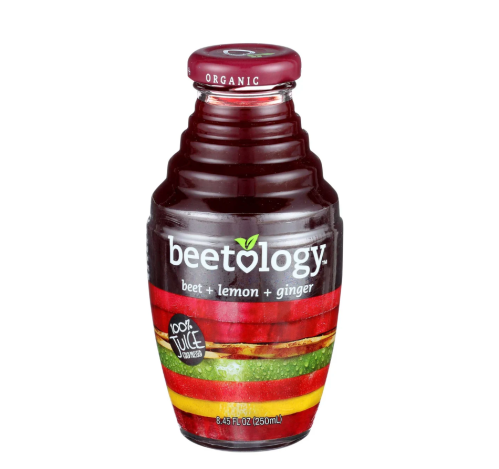After nearly 20 years of working out consistently, I’ve settled into a pretty solid routine: I wake up around 7 a.m., drink my pre-workout supplement and eat a Rice Krispies Treat (my favorite pre-workout snack!), get to the gym around 7:30, train for about an hour, stretch, come back, make a protein shake, and get on with my day.
Experts in This Article
clinical nutritionist at NYU Langone Sports Performance Center
Although I like the boost it gives me, pre-workout supplements are generally frowned upon. They aren’t regulated by the FDA, often have exaggerated or unfounded claims, and can contain some sketchy ingredients like artificial sweeteners and fillers. I also know that I can really only tolerate about half a scoop mixed with 8 to 10 ounces of water because it contains a lot of caffeine, and I don’t like how jittery it can make me.
I had been seeing research about how beetroot juice (aka beet juice) has promising training benefits, such as improving sprint performance, boosting high-intensity exercise, sharpening brain function, and helping with endurance in athletes. There was also a study published in January claiming that consuming beetroot juice “significantly increased muscle force while exercising.”
Intrigued, I decided to put the beet juice theory to the test for a couple of weeks. I strength train about four days a week and do 30 minutes of cardio one to two days a week, so I was curious what would happen if I kept my pre-workout powder in the cabinet and opted for something more natural instead.
I also enlisted the expertise of a sports dietitian to break down why beetroot juice has a unique advantage—and if it’s really worth the hype.
The power of beet juice is in its dietary nitrate
The reason beet juice in particular has been studied in connection to athletic performance is that it contains dietary nitrate. When the dietary nitrate interacts with the saliva in your mouth, it makes nitric oxide, explains Nicole Lund, MPH, RDN, clinical nutritionist at NYU Langone Sports Performance Center. This nitric oxide in the body is what is believed to be the mechanism that can increase athletic performance: It relaxes blood vessels, which increases blood flow and delivers more oxygen to your muscles, thereby improving endurance and strength.
Since this is a pretty scientific process, the benefits depend on how much beetroot juice you’re drinking and how soon before a workout. With all the studies out there assessing beet juice and athletic performance, the amounts range from a few ounces to two full cups beforehand, but it appears that drinking 16 ounces is the standard protocol. It’s also most widely believed that the effects will start to kick in around an hour after drinking it, with a peak effect happening after two to three hours.

Beetology Organic Beet Plus Lemon and Ginger Juice — $43.00
Case of six 8.45 fluid ounce bottles
Lund clarifies, however, that all of this depends on the person, and some research points to certain people just not responding to beetroot juice or dietary nitrate at all, so there could be a genetic component. It’s also important to note that in all the studies that have been published, women are vastly underrepresented. And many of the studies only lasted a short amount of time, so there isn’t a ton of research to assess the long-term benefits of drinking beetroot juice consistently before training.
Still, Lund doesn’t see any harm in trying it. She says when she’s working with clients and assessing supplements, she asks three things: Is it legal for their sport or organization, is it safe, and is it effective?
“We know that for sure, [beetroot juice] is legal and safe, so that checks both of those,” she says. “And I think, based on everything I read, that there [are] some promising results that show it could be effective. Whether or not it’s effective for every single person, this is like with most things in the nutrition world—we don’t know.”
There are many more factors at play for peak performance
In fact, getting the most out of your training session involves a lot more than drinking beet juice a few hours beforehand. Lund says it’s important to eat an overall healthy diet, which includes enough protein, fiber, vitamins, and micronutrients to give you a “really strong foundation.”
Before a workout specifically, she says some people do better training either on an empty stomach or eating just a small amount of carbs, especially if it’s first thing in the morning. If you have a little more time, she recommends incorporating something with carbs and protein, especially if it’s a longer workout or high intensity. It’s also super important to be hydrated before your workout.
Other factors that can impact your performance include if you got quality sleep the night before and if you are properly resting and recovering in between workouts.
What happened when I tried beet juice
Since I’m a journalist committed to my assignment, I grabbed two 32-ounce bottles of beetroot juice made with organic fresh-pressed beets and organic lemon juice from Whole Foods. I started this experiment on my first day back at the gym after being out of town for over a week, so I was already off my regular workout routine and wasn’t sure how strong I’d feel.
I drank 12 ounces of the beet juice three hours before a lower-body workout, and it tasted pretty delightful! Definitely better than I was expecting. Within that time, I also had two cups of cold brew and a pre-workout snack of a brown rice cake with all-natural peanut butter and half a Rice Krispies Treat since I knew I’d get hungry and need something more substantial before hitting the gym later than I normally do.
Since I hadn’t done a lower-body workout in a while, I started off my barbell squat at 115 pounds (I usually go up to 125). It felt super heavy, so I didn’t increase the weight for the remaining three sets. I continued the rest of my lower-body workout and didn’t notice much of a difference either way; I didn’t feel super strong, but I was happy to get through a workout on my first day back.
The second day was an upper-body workout, and because my schedule got hectic, I didn’t get to it until 7:15 that evening. I drank another 12 ounces of the juice around 4:15, a couple hours after I had lunch. I felt surprisingly good during my workout, especially since I hadn’t done an upper-body workout in about 10 days. Although I had enough energy, I only maxed out on my incline bench press with 25-pound dumbbells (I had previously been maxing out with 30s). Still, I was satisfied with my workout.
On my cardio day, I drank the beet juice about two-and-a-half hours before a 30-minute Peloton indoor cycling class, and I didn’t notice much of a difference. Again, I hadn’t done cardio for over a week, so it could have been my lack of endurance. But I usually feel more of a boost when I take my pre-workout powder beforehand. This was also in the late morning, and I had only had a protein bar for breakfast, so I was starting to get hungry, which didn’t help my workout.
When I had my next lower-body day, I did notice that I felt stronger and could lift a little heavier than I had on my previous leg day. I met my max weight in barbell squats and even went up 20 pounds on the leg press. This workout was about three hours after drinking the beet juice and about two hours after eating lunch, so the increase in performance also could have been tied to the salmon, rice, and veggies I ate.
After six workouts, I realized it was just too tough to fit this into my schedule since so much of the beet juice effectiveness boils down to timing. Since I typically work out right away in the morning, it was a hassle to wait until some point during the day after the beet juice had enough time to kick in. Even if there was some performance benefit, it started to interfere with my eating schedule, meetings, and other obligations. I much prefer to exercise first thing to get it out of the way and train before I’ve eaten anything that will upset my stomach. Although I had planned to continue this experiment for another week, it really wasn’t working with my schedule, especially when I started to get very busy.
Plus, I personally didn’t notice that much of an endurance or athletic boost. Although my second lower-body workout was better than the one prior, this also could have been because of what I ate at lunch or because I was getting back into a workout groove after being away.
Why I probably won’t continue drinking beet juice
Although there is pretty compelling evidence to suggest that beetroot juice can be beneficial during training, for me, trying to time a workout two to three hours after drinking it was more of a hassle than it was worth. I prefer the boost I get from my pre-workout powder (I know it’s not the healthiest option, don’t come after me!), especially since I only need to drink that about 20 minutes before my workout.
But as Lund says, there is no harm in trying beetroot juice out for yourself to see if you reap any of the benefits. “I think that there’s a time and a place for these kind of safer things to dabble in, but it’s never going to replace high-quality sleep, a good diet, proper recovery, and rest,” Lund says. Still, if you’re looking to experiment, it might be worth a shot—just don’t be alarmed when there’s a pink or reddish tinge when you go to the bathroom.
Sign up for the Well+Good SHOP Newsletter
Get exclusive deals on wellness, beauty, fitness, and food products that have been hand-picked by our editors.
Got it, you've been added to our email list.











